Many homeowners aspire to incorporate some vibrant greenery onto or alongside their pergolas. While we previously discussed the best flowering plants for pergolas, let’s explore the options for those interested in cultivating something delicious instead!
Growing fruiting vines over a pergola serves a dual purpose: it creates a shaded outdoor area while allowing you to enjoy fresh, homegrown fruit. In the subtropical climate of Brisbane, many varieties of fruiting vines flourish, yielding delicious harvests and providing natural greenery and cooling shade for your backyard oasis.
However, it’s essential to note that not all fruiting vines are suitable for pergolas. Some varieties, such as kiwi vines, demand a robust structure due to their heavy growth patterns, whereas others, like passionfruit, are rapid growers that require consistent pruning to maintain their shape and health.
Here’s a comprehensive guide on the top fruiting vines ideal for pergolas in Brisbane, including their growing requirements and essential tips for ensuring healthy, productive plants.
1. Passionfruit (Passiflora edulis) – The Ultimate Pergola Climber
Best for: Brisbane gardens, rapid growth, delectable fruit, and creating pollinator-friendly habitats
Passionfruit is an exceptional choice for covering a pergola, as it yields lush foliage, stunning purple and white flowers, and sweet, tropical fruit. This fast-growing tendril climber can effectively cover a pergola in just one growing season.
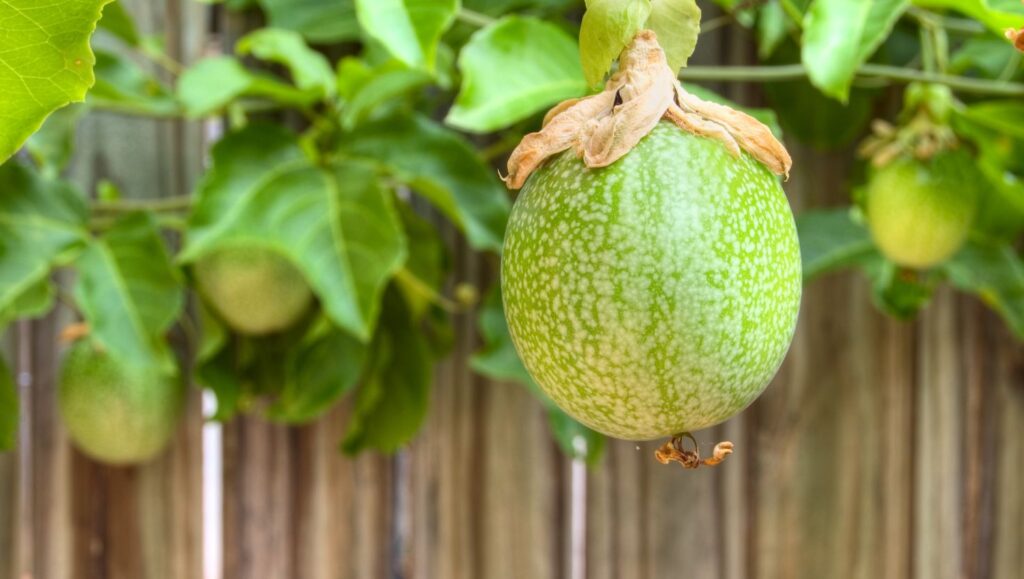
Optimal Growing Conditions for Passionfruit
- Sunlight: Requires full sun exposure (at least 6 hours daily)
- Soil: Prefers well-drained, slightly acidic soil with a pH of 6.5–7.5
- Watering: Needs deep watering 2–3 times weekly during dry spells
- Fertilizing: High-potassium fertilizer recommended every 4–6 weeks during the growing season
- Pruning: Prune after fruiting to promote fresh growth and prevent overgrowth
Top Passionfruit Varieties for Brisbane Gardens
- Nellie Kelly (Grafted Purple Passionfruit) – Known for disease resistance and high productivity
- Panama Red & Panama Gold – Larger fruit, heat-tolerant, perfect for subtropical conditions
- Sweet Granadilla (Passiflora ligularis) – Produces aromatic fruit but prefers cooler temperatures
Expert Tips for Cultivating Passionfruit on a Pergola
- Train young vines along the pergola beams to promote uniform growth and coverage
- Regularly prune excess growth to enhance airflow and sunlight penetration
- Plant near a fence or trellis for additional support
2. Kiwi Fruit (Actinidia deliciosa) – Strong Support Required for This Climber
Best for: Large, robust pergolas that can support heavy growth
Kiwi vines are vigorous and heavy growers, necessitating a very sturdy pergola to bear their weight. As deciduous plants, they shed their leaves in winter, allowing sunlight to filter through when shade is less critical.
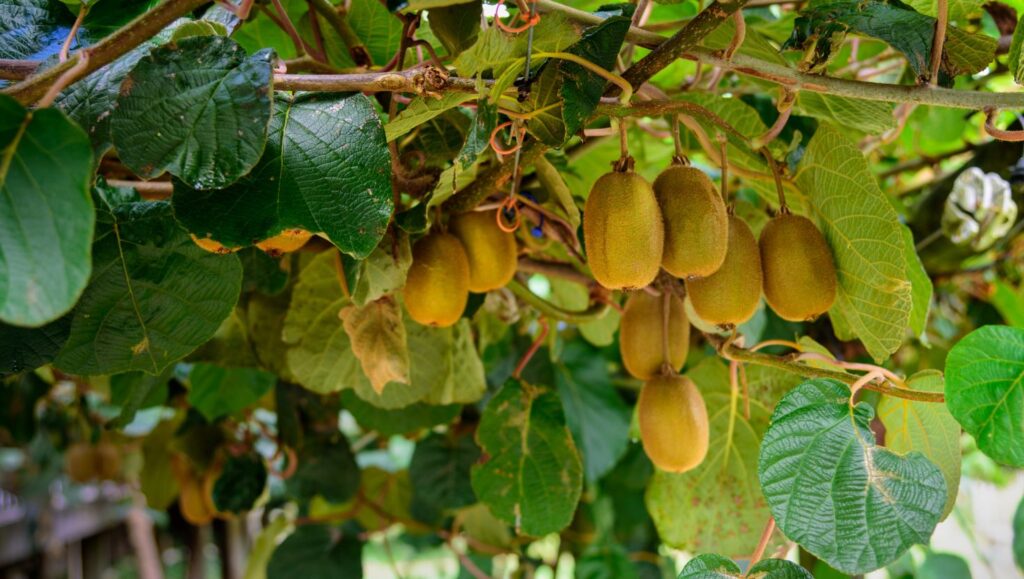
Optimal Growing Conditions for Kiwi Fruits
- Sunlight: Thrives in full sun exposure
- Soil: Requires well-drained, fertile soil enriched with compost
- Watering: Needs regular watering, particularly in dry spells
- Fertilizing: Organic compost and slow-release fertilizer should be applied in spring
- Pruning: Regular pruning is crucial to manage growth and enhance fruit yield
Understanding Kiwi Pollination Needs
Kiwi vines are dioecious, meaning they have distinct male and female plants. To ensure successful pollination and fruiting, you will need at least one male plant for every 4–5 female plants.
Best Kiwi Varieties for Brisbane's Climate
- Hayward Kiwi – The most common variety, requiring a male pollinator for fruit production
- Bruno Kiwi – Known for early fruiting and vigorous growth
- Issai Kiwi – A self-pollinating variety, better suited for smaller gardens
Effective Tips for Growing Kiwi Fruits on a Pergola
- Install strong wooden or steel support beams to accommodate the vine’s weight
- Space vines at least 3–4 meters apart to allow for adequate spread
- Regular pruning is necessary to manage excessive growth effectively
3. Grapes (Vitis vinifera) – Add a Mediterranean Flair to Your Pergola
Best for: Traditional garden pergolas offering shaded outdoor dining experiences
Grapes are a fantastic option for pergolas, providing dense shade during summer while allowing sunlight to filter through in winter when they lose their leaves. They require seasonal pruning but are generally low-maintenance once established.
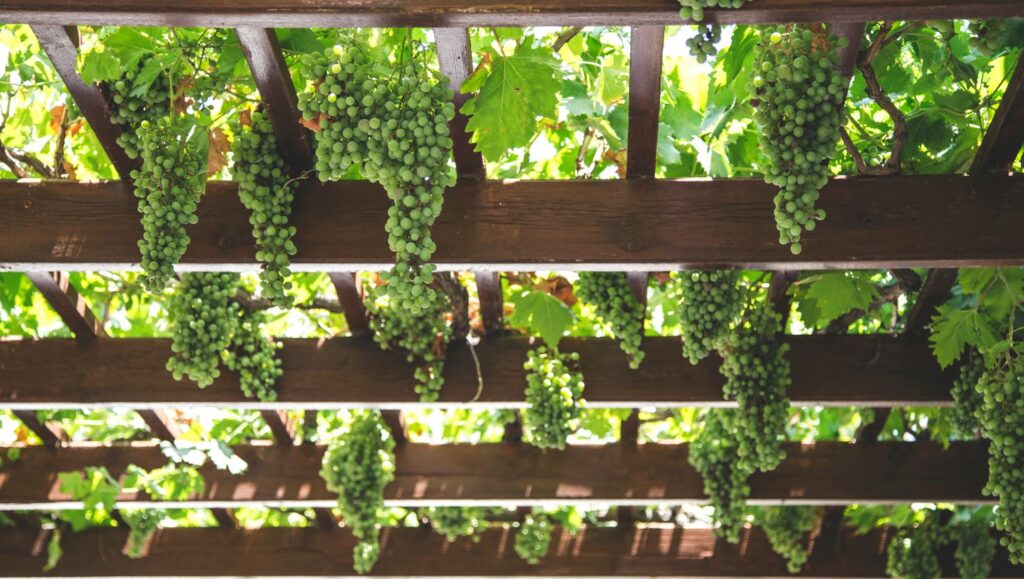
Optimal Growing Conditions for Grapes
- Sunlight: Requires full sun (minimum 6 hours daily)
- Soil: Prefers well-drained sandy or loamy soil
- Watering: Needs deep watering weekly during dry periods
- Fertilizing: Organic mulch and balanced fertilizer should be applied in spring
- Pruning: Essential for removing excess wood and promoting fruit production
Best Grape Varieties for Brisbane's Gardens
- Flame Seedless – Sweet red grapes, perfect for fresh consumption
- Sultana (Thompson Seedless) – Ideal for fresh eating or drying
- Black Muscat – Produces large, juicy fruit with a rich flavor
Expert Tips for Growing Grapes on a Pergola
- Prune annually to maintain shape and promote fruiting spurs
- Train vines along pergola beams to achieve uniform coverage and support
- Use netting to protect fruit from birds during the ripening season
4. Choko (Sechium edule) – A Quick-Growing, Low-Maintenance Vine
Best for: Gardeners seeking low-maintenance options and rapid coverage for their pergolas
Choko (or chayote) is a fast-growing vine that yields abundant pear-shaped fruit. It is remarkably low-maintenance and can effectively cover a pergola within a few months, making it an excellent choice for creating shady areas. Be careful not to confuse it with the “moth plant.”
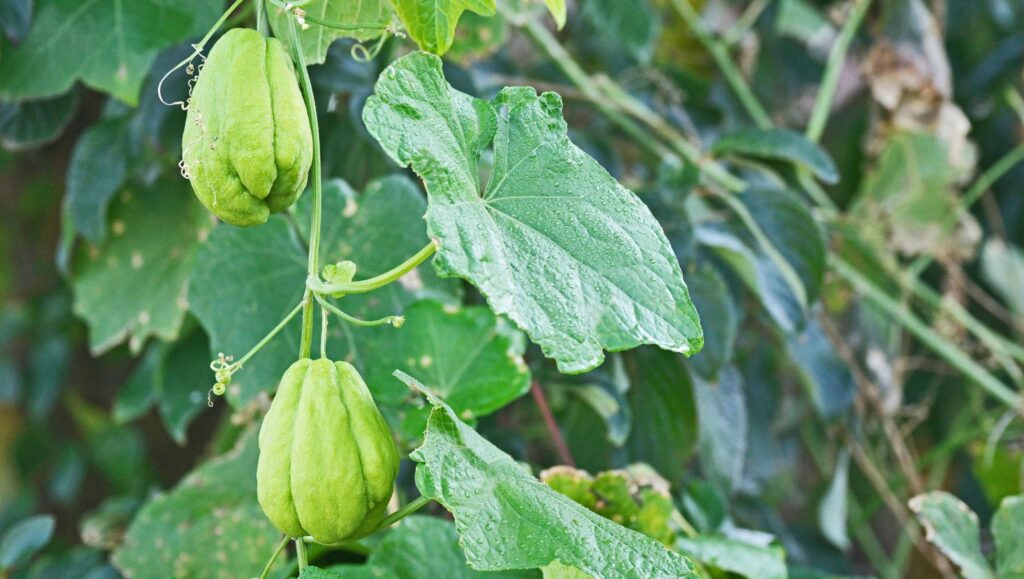
Optimal Growing Conditions for Choko
- Sunlight: Thrives in full sun to partial shade
- Soil: Requires well-drained, compost-enriched soil
- Watering: Needs regular watering during dry months
- Fertilizing: Benefits from organic compost and seaweed-based fertilizers
- Pruning: Regular trimming is necessary to control growth
Expert Tips for Growing Choko on a Pergola
- Choko vines tend to spread quickly, so be ready to prune frequently
- Fruits grow on long tendrils, making them easy to harvest
- Can tolerate drier conditions, making it a suitable choice for Brisbane’s climate
Understanding the Difference: Moth Plant vs. Choko
Many gardeners in Brisbane cultivate choko (Sechium edule) as an easy-to-manage vine for edible fruit and rapid pergola coverage. However, some mistakenly grow the moth plant (Araujia sericifera). The moth plant is a toxic, fast-spreading vine native to South America, currently classified as an invasive weed in Queensland. Introduced as an ornamental species, it has become a significant pest, smothering native vegetation and spreading aggressively.
If you’re cultivating choko or other climbing vines, it’s crucial to learn how to identify and eradicate moth plants before they proliferate and threaten your garden and local ecosystems.
5. Dragon Fruit (Hylocereus spp.) – An Uncommon Climbing Cactus
Best for: Unique edible landscapes and low-water-use pergolas
Dragon fruit is a cactus vine that yields vibrant pink or yellow fruit filled with sweet, refreshing flesh. It exhibits drought tolerance, making it an ideal candidate for low-maintenance gardens.
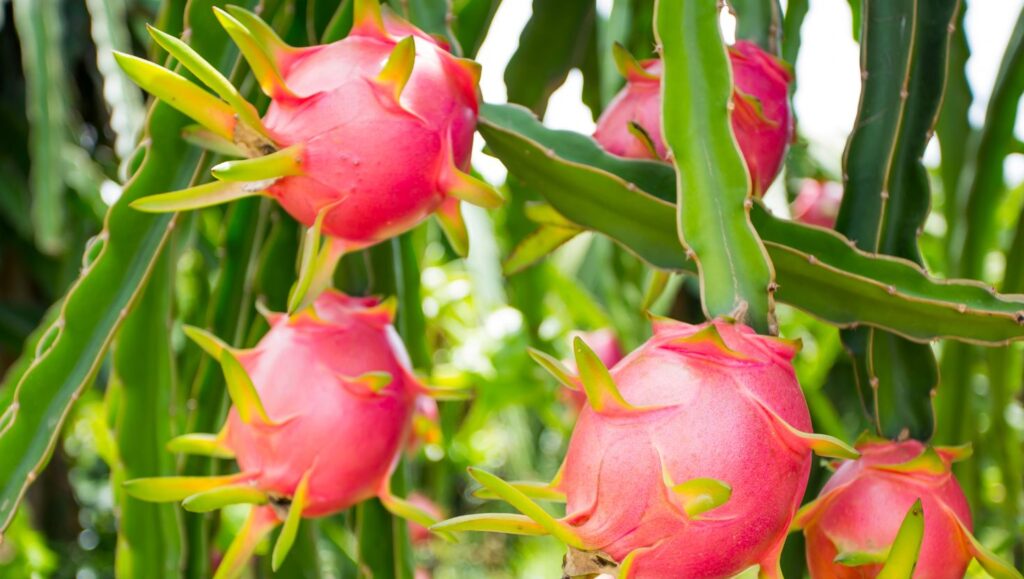
Optimal Growing Conditions for Dragon Fruit
- Sunlight: Requires full sun
- Soil: Thrives in well-drained, sandy soil enriched with organic matter
- Watering: Minimal; needs deep watering only during dry months
- Fertilizing: Light applications of organic fertilizer recommended every 2 months
- Pruning: Keep growth in check and encourage upward climbing
Best Dragon Fruit Varieties to Grow
- White-fleshed dragon fruit – Offers a mild, sweet flavor
- Red-fleshed dragon fruit – Known for its intense sweetness and high antioxidant content
- Yellow dragon fruit – Smaller in size but exceptionally sweet
Best Practices for Growing Dragon Fruit on a Pergola
- Provide a sturdy trellis or pergola support, as dragon fruit can become quite heavy
- Be aware that flowers bloom at night and are typically pollinated by bats or moths
- Consider hand pollination to increase fruit yield
Selecting the Perfect Fruiting Vine for Your Pergola
Each fruiting vine showcases distinct growth habits, weight requirements, and pruning needs. Passionfruit is ideal for rapid coverage, while kiwi and grapes necessitate sturdier pergolas. Dragon fruit presents a unique edible option with minimal water requirements.
Ready to create the perfect pergola to support your fruiting vines?
Contact Pergolas Brisbane at (07) 3064 0661 for specialized advice on custom pergola design and installation.
Best Fruiting Vines for a Pergola in Brisbane – Passionfruit, Kiwi & More



This exploration of fruiting vines for pergolas in Brisbane is particularly relevant for homeowners looking to blend aesthetics with functionality in their outdoor spaces. I appreciate the emphasis on the balance between growth requirements and structural support.
I love the idea of integrating fruiting vines into pergolas—there’s just something so rewarding about enjoying homegrown fruit right from your backyard. In my experience, passionfruit has been a real standout; not only does it grow quickly, but the fragrance alone can transform the entire space into a tropical paradise. However, I did struggle with pruning initially, and it took time to learn the right balance to keep it healthy while maximizing fruit production.
I love the idea of integrating fruiting vines on a pergola! It’s such a beautiful way to combine aesthetics with functionality. I’ve been considering adding some to mine, especially since I’d love to have access to fresh fruit right at home.
Growing fruiting vines around a pergola sounds like such a rewarding project! I’ve always loved the idea of combining aesthetics with practicality in the garden. In Brisbane, it seems like the options are practically endless. I’ve been considering adding some grapevines to my pergola, as they not only provide lovely shade but also produce delicious fruit for snacking and making homemade jams.
I love the idea of combining functionality and aesthetics with fruiting vines on pergolas! It really transforms the outdoor space into something special. I have been considering adding some grapevines to my own pergola for both shade and snacks. I’ve heard they can really thrive in Brisbane’s climate, but I also worry about their tendency to take over. Do you have any tips for managing their growth while still keeping them productive?
The idea of cultivating fruiting vines over a pergola is not only practical but also incredibly rewarding, blending the joys of gardening with the pleasure of fresh, homegrown produce. Living in the subtropical climate of Brisbane, I can certainly appreciate the bounty that can come from such an endeavor. I’ve experimented with growing passionfruit on my own pergola, and it’s been delightful to watch the vines thrive and produce fruit, while creating a beautifully shaded space for gatherings.
It’s interesting to consider how fruiting vines not only add beauty but also contribute to a sustainable lifestyle. In my experience, growing your own fruits like passionfruit or grapes can significantly enhance outdoor gatherings; there’s something special about serving a dish or drink infused with homegrown produce. However, I’m curious about the climate impacts on these vines—not just the subtropical heat, but also how changing weather patterns may affect fruiting cycles in the future.
You raise some great points about the dual benefits of fruiting vines, both aesthetically and in terms of sustainability. There’s definitely something enriching about incorporating homegrown fruits into meals; it adds a level of authenticity that you just can’t replicate with store-bought produce. I remember hosting a small gathering where we served a cocktail made with homegrown passionfruit. It sparked a deeper conversation about food origins, which was a neat way to connect with friends.
I really appreciate how you highlighted the dual benefits of using fruiting vines on pergolas! I’ve been toying with the idea of transforming my outdoor space into a little urban oasis, and the thought of having fresh fruit within arm’s reach is pretty enticing. The combination of shade and food is definitely a win-win.
I found your insights on fruiting vines for pergolas, particularly in a climate like Brisbane’s, to be incredibly relevant and inspiring. Growing edible plants alongside our living spaces not only beautifies our surroundings but also enhances our connection to food and nature, which is particularly important in today’s fast-paced world. The idea of harvesting fresh fruit from my own backyard is such an enticing proposition, especially when it comes to incorporating that into family meals or home-cooked desserts.
It’s interesting to consider how the choice of fruiting vines not only impacts the aesthetic and functional aspects of a pergola but also shapes the overall gardening experience. For instance, while I agree that kiwi vines are stunning, their structural demands can be daunting for amateur gardeners. I’ve had my share of struggling with heavy plants that outgrew their support, leading me to appreciate more manageable options, like grapevines.
It’s interesting to see the focus on fruiting vines for pergolas, especially in a subtropical climate like Brisbane’s, where the right selections can truly transform outdoor spaces. I’ve been toying with the idea of growing grapevines over my own pergola, primarily for the aesthetic and shade they provide, but I’m also intrigued by the idea of incorporating varieties like passionfruit. However, I’ve heard stories of how quickly passionfruit can take over, so I appreciate the mention of the need for regular pruning.
It’s great to hear you’re considering grapevines for your pergola. They really do add a cozy charm to outdoor spaces, especially in a climate like Brisbane’s where the warm sun can really bring them to life. Grapevines can create a lovely natural roof, not to mention the bonus of fresh fruit that you can enjoy right from your garden.
You’ve touched on a fascinating aspect of gardening that beautifully merges aesthetics with functionality. The idea of cultivating fruiting vines over a pergola in Brisbane not only enhances the visual appeal of outdoor spaces but also contributes to a sustainable lifestyle. As someone who has experimented with various plants, I can appreciate the importance of selecting the right species for both structure and maintenance.
The idea of cultivating fruiting vines on a pergola is incredibly appealing, especially in an area like Brisbane where the climate can enhance the growth of these delightful plants. I appreciate the emphasis on both aesthetics and practicality, as a pergola adorned with edible vines can be not only a beautiful feature but also a valuable source of fresh produce.
You’re spot on about the appeal of having fruiting vines on a pergola in Brisbane. The local climate really does create the perfect setting for these plants to flourish. I think there’s something special about having that blend of beauty and function in your garden. A pergola with vines can create a little oasis, a go-to spot for relaxation that also gives you fresh produce, all without having to step into a supermarket.
Creating a lush oasis with fruiting vines on a pergola is such a wonderful idea, especially in a climate as conducive to growth as Brisbane’s! I love the concept of combining beauty with functionality—having a shaded space to relax while feasting on homegrown fruits is truly the dream.
Creating a lush oasis with fruiting vines on a pergola really does feel like such a beautiful blend of aesthetics and practicality. In Brisbane’s warm climate, it’s amazing how quickly plants can thrive, turning just any outdoor space into a little paradise. I’ve been contemplating which varieties might work best, perhaps some passionfruit or grapes. They not only provide shade but also add such a vibrant touch to the area.
It’s fascinating to see how so many people are looking to blend function and beauty in their outdoor spaces! I’ve always felt that a pergola adorned with fruiting vines not only enhances the aesthetic of a backyard but also turns it into an edible landscape.
I love the idea of combining aesthetics with practicality by growing fruiting vines on a pergola! In my backyard, I’ve had great success with grapevines, which not only provide a beautiful canopy but also yield sweet, juicy grapes during the warmer months. I’ve found that a little creativity goes a long way—building a trellis system has helped manage their growth and maximize fruit production.
This is a really intriguing topic, and I appreciate the nuanced details about fruiting vines for pergolas in Brisbane’s subtropical climate. As someone who has been exploring the idea of transforming my outdoor space into a vibrant, productive garden, your insights resonate deeply. The concept of cultivating edible plants not only serves practical purposes like shade and aesthetics but also promotes a more sustainable lifestyle, which is increasingly important in today’s society.